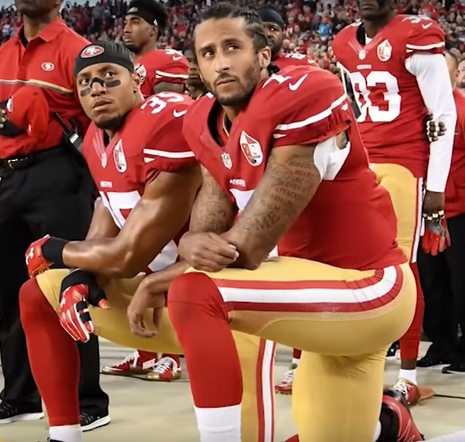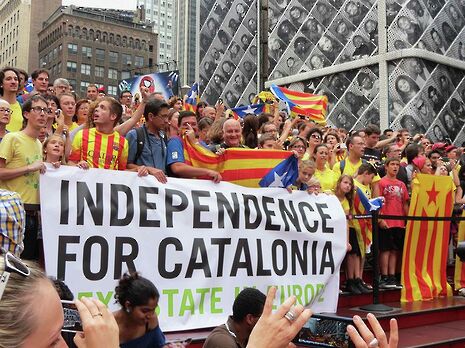‘You have the right to remain silent’ – on national anthems and national identity
With Colin Kaepernick’s actions continuing to provoke heated debate, Tom Higgins Toon argues that no athlete should feel obliged to sing their national anthem

Watching a dour England performance during the Euros, I quietly let it slip to my contemporaries that I didn’t sing the national anthem before games. “What?!” they all spluttered, as if I had just offered to poison the Queen. Unable to seek diversion from Harry Kane’s set-pieces, I was left wondering why my personal opinions regarding nationalism, respect and social cohesion generated so much opprobrium among otherwise open-minded individuals.
Events across the Atlantic recently brought this issue back to mind, when NFL star Colin Kaepernick exercised his democratic right to protest by remaining seated for the ‘Star Spangled Banner’ before a pre-season game against the Green Bay Packers. Targeting racism in a country in which black citizens are twice as likely to die from gun violence than their white counterparts, the San Francisco 49ers quarterback stated his reluctance to “show pride in a flag for a country that oppresses black people and people of colour”. Branded as a “traitor” by other figures within the NFL and hounded on social media — several fans posted videos burning his jersey, such was their vitriol — it seems that there remains a strong taboo attached to questioning social attachment on a national scale.
In fairness, most of his critics were reacting to what they perceived to be a disregard for the selfless acts of American servicemen fighting in the interests of their country. Realising this, Kaepernick elected to kneel in silence during the following rendition, thus pursuing his campaign while showing the respect that he truly held for soldiers who had so bravely put their lives on the line. It is the same story with Northern Irish footballer James McClean, who in the past has had to endure tabloid hostility for his numerous gestures of disrespect to civilians killed during The Troubles, which include turning his back on the national anthem and wearing a jersey without a poppy for fixtures around Remembrance Sunday. His stance is not, however, inherently disrespectful of British soldiers: “If the poppy was simply about World War One and Two victims alone, I’d wear it without a problem.”
By remaining silent for the national anthem, figures like Kaepernick and McClean are all too often portrayed as treacherous villains, biting the national hand that feeds them. However, the irony of the American situation is that the way in which their national anthem is treated reflects the impossibility of an all-encompassing sense of belonging on the national scale. Ten years ago, a Spanish version of the ‘Star Spangled Banner’ was produced so that 12 per cent of the population could show their appreciation for American values. George Bush was quick to voice his opposition, and the following month, the matter was brought up in the Senate. Apparently, a national sense of belonging does not even transcend linguistic barriers, let alone racial ones: indeed, for as long as central governments fail to accommodate minority groups, the concept of national identity will remain fundamentally flawed.

Furthermore, not all citizens share the same national values as eulogised by a national anthem. Spain is one of only four countries in the world to forgo lyrics in its national number, despite a 2007 competition with the aim of coming up with some that best reflected a Spanish national identity. Naturally, no lyrics were found to be universally suitable, simply because few people in Spain feel as if they belong to a national community with common beliefs. Catalans, Basques and, to a certain extent, Galicians all want a referendum on independence, and such is the taboo surrounding national affiliation that, in many regions, politicians resort to displays of astounding verbosity to avoid using the term ‘España’ under any circumstances.
Spain may be one of the more decentralised European states, but that is not to say that the citizens of other countries should feel any great sense of cohesion with their compatriots simply because they share nationality. In the case of the UK, why should anyone be castigated for refusing to acknowledge the greatness of the nation with London and the South East being the only regions in England in which wages are above the national average? The Brexit vote showed that the UK is fundamentally and irreconcilably split over the importance of belonging to the European community, and with applications for Irish (i.e. European) citizenship rising by 70 per cent since the referendum, it would appear that nationality doesn’t count for too much in matters of principle.
Of course, I am not trying to say that national anthems should be abolished before sporting fixtures, or indeed at all. For some, it is a way of showing respect, and for others, a mark of patriotism. However, there are equally valid reasons for remaining silent, and in the 21st century, those who choose to do so should not fear retribution.
 News / Eight Cambridge researchers awarded €17m in ERC research grants27 December 2025
News / Eight Cambridge researchers awarded €17m in ERC research grants27 December 2025 News / Downing investigates ‘mysterious’ underground burial vault 29 December 2025
News / Downing investigates ‘mysterious’ underground burial vault 29 December 2025 Lifestyle / Ask Auntie Alice29 December 2025
Lifestyle / Ask Auntie Alice29 December 2025 Sport / Hard work, heartbreak and hope: international gymnast Maddie Marshall’s journey 29 December 2025
Sport / Hard work, heartbreak and hope: international gymnast Maddie Marshall’s journey 29 December 2025 Interviews / Meet Juan Michel, Cambridge’s multilingual musician29 December 2025
Interviews / Meet Juan Michel, Cambridge’s multilingual musician29 December 2025









